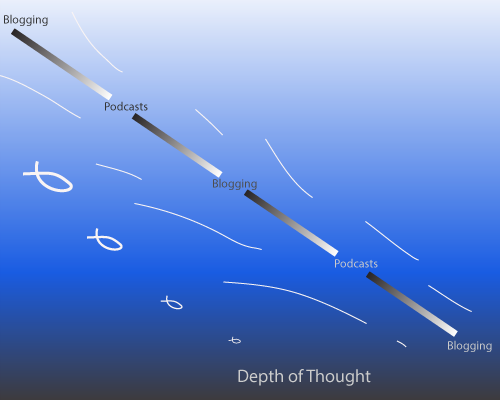The Rebirth of My Podcast
I'm going to experiment with some new podcasts, but I want to try something different. The other day I was listening to Boagworld on the way to work, because I think Paul Boag is one of the most successful and longstanding podcasters. He starts out with some playful cohost banter, followed by a few news items that he discusses with his cohosts, and then gets into some techniques and principles for web design, and then usually interviews someone. It's a pretty good format. The shows last about an hour.
I used to listen to Boagworld regularly but kind of veered into audio books on Audible.com over the past year and a half instead. Listening to Boagworld again, I see that he's added another cohost, which I think is a mistake. During their cohost banter, it's like listening to a group of guys laughing and joking obnoxiously in a small room. It's hard to distinguish who's who, and they seem to be laughing at a lot of inside jokes.
In looking at my strengths, it's not with a cohost format, nor with news or cohost banter. I enjoy more cerebral podcasts. I also want to find a format that suits my creative strengths well and complements my writing rather than replacing it. (I actually stopped podcasting during the past year and a half so that I could focus on my writing.)
This week I decided on a format that might work. Podcasts don't need to be an alternative format to writing. Audio can complement writing efforts in powerful ways. Here's how: When you sit down to write, you can push your ideas only so far. At some point, your creative well runs dry. You need to talk with some other people to go further with the topic.
Sometimes people read what others have written as a means of figuratively conversing with others. But interviewing experts in a podcast also works, perhaps in a more immediate and thorough way, since you can control the conversation, move in the direction you want, and ask difficult, relevant questions. The expert provides a way to move forward with an exploration of a topic.
And then, based on the expert's responses, you should have a new starting point for the next blog post. You move from A to B to C to D infinitely. A is the blog post, B is the podcast, C is the blog post, D is the podcast, and so on. You couldn't necessarily get to B without A, nor could you get to C without B, nor D without C, and so on.

Of course thought doesn't move in such a linear way, but you get the point: Podcasts and blogging complement each other in the exploration of ideas.
My problem with podcasting previously was that I didn't understand this alternating thread between writing and conversation. Now that I do see it, hopefully I won't feel like there's a split purpose between the two activities. Both writing (blogging) and discussion (podcasting) are aimed at the same goal of exploring ideas. One medium takes you places that the other medium can't.
About Tom Johnson

I'm an API technical writer based in the Seattle area. On this blog, I write about topics related to technical writing and communication — such as software documentation, API documentation, AI, information architecture, content strategy, writing processes, plain language, tech comm careers, and more. Check out my API documentation course if you're looking for more info about documenting APIs. Or see my posts on AI and AI course section for more on the latest in AI and tech comm.
If you're a technical writer and want to keep on top of the latest trends in the tech comm, be sure to subscribe to email updates below. You can also learn more about me or contact me. Finally, note that the opinions I express on my blog are my own points of view, not that of my employer.

